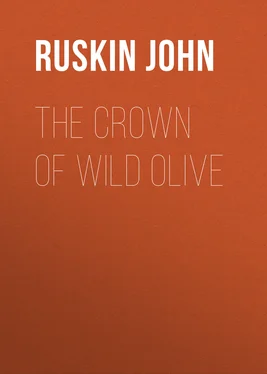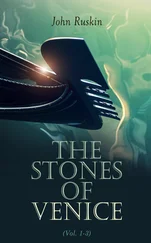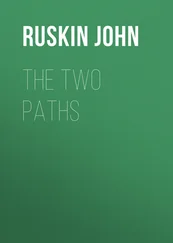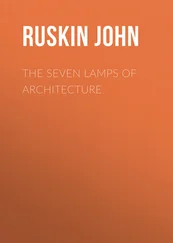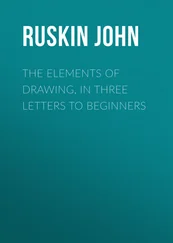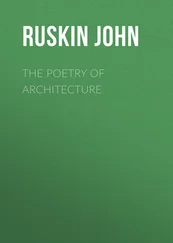John Ruskin - The Crown of Wild Olive
Здесь есть возможность читать онлайн «John Ruskin - The Crown of Wild Olive» — ознакомительный отрывок электронной книги совершенно бесплатно, а после прочтения отрывка купить полную версию. В некоторых случаях можно слушать аудио, скачать через торрент в формате fb2 и присутствует краткое содержание. Жанр: foreign_antique, foreign_home, literature_19, visual_arts, на английском языке. Описание произведения, (предисловие) а так же отзывы посетителей доступны на портале библиотеки ЛибКат.
- Название:The Crown of Wild Olive
- Автор:
- Жанр:
- Год:неизвестен
- ISBN:нет данных
- Рейтинг книги:4 / 5. Голосов: 1
-
Избранное:Добавить в избранное
- Отзывы:
-
Ваша оценка:
- 80
- 1
- 2
- 3
- 4
- 5
The Crown of Wild Olive: краткое содержание, описание и аннотация
Предлагаем к чтению аннотацию, описание, краткое содержание или предисловие (зависит от того, что написал сам автор книги «The Crown of Wild Olive»). Если вы не нашли необходимую информацию о книге — напишите в комментариях, мы постараемся отыскать её.
The Crown of Wild Olive — читать онлайн ознакомительный отрывок
Ниже представлен текст книги, разбитый по страницам. Система сохранения места последней прочитанной страницы, позволяет с удобством читать онлайн бесплатно книгу «The Crown of Wild Olive», без необходимости каждый раз заново искать на чём Вы остановились. Поставьте закладку, и сможете в любой момент перейти на страницу, на которой закончили чтение.
Интервал:
Закладка:
'They carved at the meal
With gloves of steel,
And they drank the red wine through the helmet barr'd;—
do you think that this national shame and dastardliness of heart are not written as legibly on every rivet of your iron armour as the strength of the right hands that forged it? Friends, I know not whether this thing be the more ludicrous or the more melancholy. It is quite unspeakably both. Suppose, instead of being now sent for by you, I had been sent for by some private gentleman, living in a suburban house, with his garden separated only by a fruit-wall from his next door neighbour's; and he had called me to consult with him on the furnishing of his drawing room. I begin looking about me, and find the walls rather bare; I think such and such a paper might be desirable—perhaps a little fresco here and there on the ceiling—a damask curtain or so at the windows. 'Ah,' says my employer, 'damask curtains, indeed! That's all very fine, but you know I can't afford that kind of thing just now!' 'Yet the world credits you with a splendid income!' 'Ah, yes,' says my friend, 'but do you know, at present, I am obliged to spend it nearly all in steel-traps?' 'Steel-traps! for whom?' 'Why, for that fellow on the other side the wall, you know: we're very good friends, capital friends; but we are obliged to keep our traps set on both sides of the wall; we could not possibly keep on friendly terms without them, and our spring guns. The worst of it is, we are both clever fellows enough; and there's never a day passes that we don't find out a new trap, or a new gun-barrel, or something; we spend about fifteen millions a year each in our traps, take it all together; and I don't see how we're to do with less.' A highly comic state of life for two private gentlemen! but for two nations, it seems to me, not wholly comic? Bedlam would be comic, perhaps, if there were only one madman in it; and your Christmas pantomime is comic, when there is only one clown in it; but when the whole world turns clown, and paints itself red with its own heart's blood instead of vermilion, it is something else than comic, I think.
Mind, I know a great deal of this is play, and willingly allow for that. You don't know what to do with yourselves for a sensation: fox-hunting and cricketing will not carry you through the whole of this unendurably long mortal life: you liked pop-guns when you were schoolboys, and rifles and Armstrongs are only the same things better made: but then the worst of it is, that what was play to you when boys, was not play to the sparrows; and what is play to you now, is not play to the small birds of State neither; and for the black eagles, you are somewhat shy of taking shots at them, if I mistake not.
I must get back to the matter in hand, however. Believe me, without farther instance, I could show you, in all time, that every nation's vice, or virtue, was written in its art: the soldiership of early Greece; the sensuality of late Italy; the visionary religion of Tuscany; the splendid human energy and beauty of Venice. I have no time to do this to-night (I have done it elsewhere before now); but I proceed to apply the principle to ourselves in a more searching manner.
I notice that among all the new buildings that cover your once wild hills, churches and schools are mixed in due, that is to say, in large proportion, with your mills and mansions and I notice also that the churches and schools are almost always Gothic, and the mansions and mills are never Gothic. Will you allow me to ask precisely the meaning of this? For, remember, it is peculiarly a modern phenomenon. When Gothic was invented, houses were Gothic as well as churches; and when the Italian style superseded the Gothic, churches were Italian as well as houses. If there is a Gothic spire to the cathedral of Antwerp, there is a Gothic belfry to the Hôtel de Ville at Brussels; if Inigo Jones builds an Italian Whitehall, Sir Christopher Wren builds an Italian St. Paul's. But now you live under one school of architecture, and worship under another. What do you mean by doing this? Am I to understand that you are thinking of changing your architecture back to Gothic; and that you treat your churches experimentally, because it does not matter what mistakes you make in a church? Or am I to understand that you consider Gothic a pre-eminently sacred and beautiful mode of building, which you think, like the fine frankincense, should be mixed for the tabernacle only, and reserved for your religious services? For if this be the feeling, though it may seem at first as if it were graceful and reverent, you will find that, at the root of the matter, it signifies neither more nor less than that you have separated your religion from your life.
For consider what a wide significance this fact has; and remember that it is not you only, but all the people of England, who are behaving thus just now.
You have all got into the habit of calling the church 'the house of God.' I have seen, over the doors of many churches, the legend actually carved, ' This is the house of God, and this is the gate of heaven.' Now, note where that legend comes from, and of what place it was first spoken. A boy leaves his father's house to go on a long journey on foot, to visit his uncle; he has to cross a wild hill-desert; just as if one of your own boys had to cross the wolds of Westmoreland, to visit an uncle at Carlisle. The second or third day your boy finds himself somewhere between Hawes and Brough, in the midst of the moors, at sunset. It is stony ground, and boggy; he cannot go one foot farther that night. Down he lies, to sleep, on Wharnside, where best he may, gathering a few of the stones together to put under his head;—so wild the place is, he cannot get anything but stones. And there, lying under the broad night, he has a dream; and he sees a ladder set up on the earth, and the top of it reaches to heaven, and the angels of God are ascending and descending upon it. And when he wakes out of his sleep, he says, 'How dreadful is this place; surely, this is none other than the house of God, and this is the gate of heaven.' This place, observe; not this church; not this city; not this stone, even, which he puts up for a memorial—the piece of flint on which his head has lain. But this place ; this windy slope of Wharnside; this moorland hollow, torrent-bitten, snow-blighted; this any place where God lets down the ladder. And how are you to know where that will be? or how are you to determine where it may be, but by being ready for it always? Do you know where the lightning is to fall next? You do know that, partly; you can guide the lightning; but you cannot guide the going forth of the Spirit, which is that lightning when it shines from the east to the west.
But the perpetual and insolent warping of that strong verse to serve a merely ecclesiastical purpose, is only one of the thousand instances in which we sink back into gross Judaism. We call our churches 'temples.' Now, you know, or ought to know, they are not temples. They have never had, never can have, anything whatever to do with temples. They are 'synagogues'—'gathering places'—where you gather yourselves together as an assembly; and by not calling them so, you again miss the force of another mighty text—'Thou, when thou prayest, shalt not be as the hypocrites are; for they love to pray standing in the churches ' [we should translate it], 'that they may be seen of men. But thou, when thou prayest, enter into thy closet, and when thou hast shut thy door, pray to thy Father,'—which is, not in chancel nor in aisle, but 'in secret.'
Now, you feel, as I say this to you—I know you feel—as if I were trying to take away the honour of your churches. Not so; I am trying to prove to you the honour of your houses and your hills; I am trying to show you—not that the Church is not sacred—but that the whole Earth is. I would have you feel, what careless, what constant, what infectious sin there is in all modes of thought, whereby, in calling your churches only 'holy,' you call your hearths and homes profane; and have separated yourselves from the heathen by casting all your household gods to the ground, instead of recognising, in the place of their many and feeble Lares, the presence of your One and Mighty Lord and Lar.
Читать дальшеИнтервал:
Закладка:
Похожие книги на «The Crown of Wild Olive»
Представляем Вашему вниманию похожие книги на «The Crown of Wild Olive» списком для выбора. Мы отобрали схожую по названию и смыслу литературу в надежде предоставить читателям больше вариантов отыскать новые, интересные, ещё непрочитанные произведения.
Обсуждение, отзывы о книге «The Crown of Wild Olive» и просто собственные мнения читателей. Оставьте ваши комментарии, напишите, что Вы думаете о произведении, его смысле или главных героях. Укажите что конкретно понравилось, а что нет, и почему Вы так считаете.
